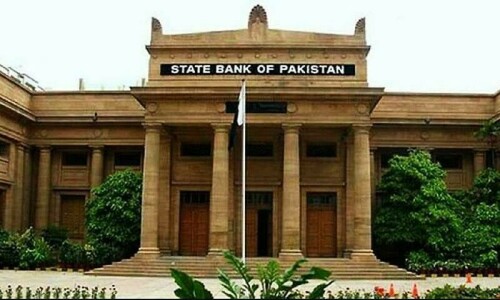KARACHI: International accounting and professional services firm PricewaterhouseCoopers (PwC), which is locally represented by A.F. Ferguson and Company, has said that ensuring compliance with “vast and frequently changing” requirements under direct and indirect tax laws, foreign exchange regulations and central bank directives has become a major challenge for the country’s banking sector.
In a detailed report on the banking sector’s opportunities and challenges released on Friday, one of the largest global accountancy and consultancy firms said banks are answerable to the federal authorities as well as four different provincial authorities, which leads to a high compliance cost.
Responding to frequent inquiries, notices and audits raised by these authorities take up sufficient time, effort and resources of banks.
“At times, there’re even potentially conflicting provisions among various laws, causing some ambiguity in the application and possible increase in legal costs,” it said in a wide-ranging report that shed light on 13 different aspects of the banking sector ranging from the financial performance to risk management and customer experience.
The standard corporate tax rate is 29 per cent, but banks were taxed at 35pc for 2021-22 and 39pc thereafter. Additionally, banks were subject to a super tax of 4pc between 2014-15 and 2021-22.
Through Finance Act 2022, a new super tax was imposed on banks at 10pc for 2022-23 and 4pc thereafter (in case their income exceeds Rs300 million a year).
Through the latest budget, the rate of super tax has again been increased to 10pc for all taxpayers having income exceeding Rs500m. “Consequent to these windfall taxes, the effective tax rate for banks has risen to 49pc in 2022-23 and onwards,” it noted, adding that banks’ income from investments in federal government securities is separately taxable at higher tax rates of up to 55pc depending on their gross advance-to-deposit ratios.
However, the operation of these rules has been suspended for 2023-24 and, at present, there is “no clarity” whether the suspension will continue for subsequent tax years.
The professional services firm also highlighted the retrospective imposition of some tax measures even though any amendments to the tax laws that have the effect of increasing the taxpayer liability should ideally be applied prospectively.
Financial crime
Based on a survey of 75 respondents consisting of banks’ chief compliance officers and heads of key business and enabling functions, the report said the perceived risk of major types of financial crime, including money laundering, terrorism financing and sanctions, reduced in 2022 from the 2019 level.
This was mainly owing to the level of trust that respondents placed in organisational progression to comply primarily with newer or amended regulatory requirements, it said.
“However, the risk of frauds has increased during that time, which may be mainly due to the impacts from the economic downturn and a flood-driven natural calamity,” it added.
With respect to the potential impacts of Russian sanctions on Pakistani banks, it said they’ll have to continue updating their sanctions screening systems and protocols to ensure enhanced scrutiny and focus on customer types and jurisdictions — including ports, containers and vessels tracking, products and services — that possess a Russian dimension to them.
China, which is one of Pakistan’s major trading partners, also tops the list of Russian trading partners with exports of over $50 billion in 2021. “This situation makes it challenging (for Pakistani banks) to identify all entities, individuals or businesses with links to Russia,” it said.
Published in Dawn, July 15th, 2023













































Dear visitor, the comments section is undergoing an overhaul and will return soon.